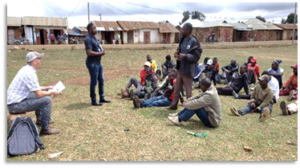Bank Expands Agricultural Lending Portfolio
F2F volunteers support bank to target needs of agricultural lenders and borrowers
Since its establishment in 2007, AccessBank Tanzania (ABT) has strived to become one of the leading providers of financial services in the country. ABT’s services target the needs of lower- and middle-income individuals and businesses, including those engaged in agriculture production in rural areas of the country. To become a leader and meet the needs of its target population, ABT needed to become more market-oriented and demand-driven, improve customer satisfaction and retention, and expand its portfolio and reach. Despite ABT’s efforts, such as training its staff and adjusting its policies and procedures, coupled with the opening of four agriculture specific branches in Mbeya, Iringa, Tabora, and Kahama, the bank’s agriculture customer base and its agro-loan portfolio continued to remain at less than 5% of the total bank loan portfolio. This led ABT to reach out to IESC’s USAID-funded Farmer-to-Farmer (F2F) Access to Finance Program in 2019 for support.

U.S. volunteer expert, Mr. Skye Root, meeting with Tanzanian farmers during his assignment in 2019
To help the bank to increase its customer base and agriculture loan portfolio, the F2F program mobilized two U.S. volunteer experts, Mr. Allyn Lamb from August 24 to September 7, 2019, and Mr. Skye Root from October 10 to October 16, 2019. Both volunteers supported ABT by conducting assessments for the bank to better understand the specific financial needs of farmers and provide recommendations on how to reach and provide services to underserved and rural farmers. Capitalizing on their real-world experience in agribusiness and finance, the two volunteers recommended that ABT expand its geographic footprint. This entailed removing their policy of only lending to clients within a 50km radius of a bank branch and allocating more resources to establish satellite branch offices closer to farmers, including hiring additional staff. The volunteers also recommended that the bank review and revise its interest rate policy to better align with competitor rates, automate and digitize the loan process, and facilitate sequenced distribution of loan financing to customers.
In line with these recommendations, the bank ended its restrictive geographic policy for lending and hired additional staff in 2020. This resulted in an increase in the number of loan officers at the Iringa branch from five to 11, five of whom focus their work on agriculture clients. In Mbeya, they also increased the number of agriculture loan officers from three to seven, with a total of 23 loan officers at that branch. Additionally, the bank automated and digitized its loan application process, introduced sequenced disbursement of loan payments, and introduced a scoring system for appraising agro-loans. The bank has also continued to review and revise its interest rate policy and agro-loan terms and conditions so that they were in alignment with the market and its competitors.
As a result of the adoption of the F2F volunteers’ recommendations, ABT Iringa branch’s agro-loan portfolio has grown from TZS 600 million, approximately $259,711 USD, in 2020 to TZS 820 million, approximately $354,938 USD, as of March 2021, coupled with a 30% expansion in its customer base. Similarly, ABT Mbeya branch’s agro-loan portfolio has grown from TZS 520 million, approximately $225,082 USD, in 2020 to about TZS 720 million, approximately $311,653 USD, as of March 2021, while the branch’s customer base has expanded by 35% this year.
ABT’s overall agriculture loan portfolio has increased by 5%, making it 10% of the overall portfolio and 25% of the customer base. When reflecting further on the technical assistance received from F2F volunteers, Prosper William, Senior Business Manager at ABT noted, “We hope to further expand these great practices to other agricultural branches of Tabora and Kahama and continue to work with the farmers for their sustainable development and the bank’s. With the support from the F2F program, now we have a strong roadmap laid out for the execution of our mission of expanding our financial services to more underserved farmers and agribusinesses in Tanzania.’’ Through access to financial services from ABT, farmers and agribusinesses in Tanzania will be able to improve their productivity and increase their incomes as well as lead sustainable community development across the country.
The American people, through the U.S. Agency for International Development, have provided economic and humanitarian assistance worldwide for more than 50 years. The John Ogonowski and Doug Bereuter Farmer-to-Farmer Program (F2F) provides technical assistance from U.S. volunteers to farmers, farm groups, agribusinesses and other agriculture sector institutions in developing and transitional countries with the goal of promoting sustainable improvements in food security and agricultural processing, production and marketing.


